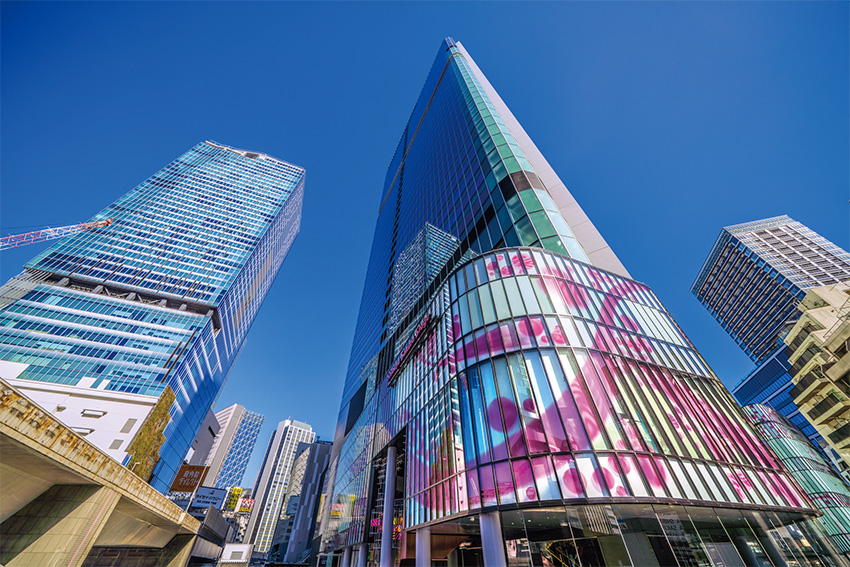A specialist in economics, business and management for more than 50 years, JUE is pursuing an innovative program of change as the role of Japanese university institutions continues to shift.

By Cian O Neill
The Japan University of Economics (JUE), which is part of the renowned Tsuzuki Education Group, was established in 1968 as a college specializing in economics and offers a broad range of courses. A multi-campus university with sites in Tokyo, Fukuoka and Kobe, it is perhaps best known today for its success in attracting foreign students to Japan, with a large portion of its over 2,000 students hailing from overseas.
This is significant for a number of reasons. With Japan facing a series of urgent challenges, including an aging population and growing domestic labor shortages, universities are set to play a crucial role in turning the country’s fortunes around. And while Japan’s ratio of international students remains lower than that of other advanced nations, JUE finds itself at the vanguard of change.
“When we ask our international students why they choose to study in Japan,” President Asuka Tsuzuki begins, “several common reasons emerge. The most frequent response is a familiarity with Japan through its anime, comics and games. Japan’s content industry holds a globally dominant position, and studying its business models and marketing strategies offers unique value. Our hospitality and culinary culture are globally recognized for their quality, and, from a business perspective, Japan has over 40,000 companies that are over a century old, the highest of any country in the world. Most of these are family businesses, and family businesses are a strength of Japan, offering valuable learning opportunities for international students.”
Additional factors that enter the conversation are Japan’s status as one of the safest countries in the world and, of course, the steady depreciation
of the yen. “Ours is a safe country with a shortage of manpower,” Ms. Tsuzuki confirms, “and it presents students with opportunities rather than risks. Students see Japan as a destination for a long-term or permanent stay.”
While that may be true, one of the most common criticisms levied against Japanese universities in recent years is a perceived lack of support for overseas students looking to remain in the country post graduation. All too often, linguistic and cultural differences present barriers in the workplace for foreign nationals hoping to secure
gainful employment.

Student PR Project Team “BlueRose”
What is it, then, that allows JUE to buck the trend, with a staggering 97 percent of its overseas graduates taking on roles in Japanese companies after completing their studies?
Ms. Tsuzuki again: “In our four-year program, we offer Japanese language and culture classes alongside specialist economics and management seminars. In recent times, Japanese companies have been increasingly proactive in hiring foreigners with excellent Japanese and English language ability. By enhancing both their Japanese language and practical business skills, international students can make a significant contribution when it comes to alleviating domestic labor shortages.”
Before all that, however, comes the undergraduate experience itself, and here too the role of universities is changing. Where once institutions might have concentrated primarily on academic excellence, the focus today is on students’ identity and tailoring the educational process to meet their individual needs.
At JUE’s Shibuya campus, located directly opposite Shibuya station, digital transformation (DX) has thus taken on an increasingly influential role. Thanks in part to the work of professors who enjoy cutting-edge status in their fields, the university has developed a new app, PEAK, which allows for the analysis and use of a wide variety of student data. All with a view to enhancing the student experience and empowering faculty and staff members to provide holistic, targeted support.
“We are proactively implementing DX as part of our educational program,” asserts Ms. Tsuzuki. “The needs of students are changing rapidly, and we see it as our mission to cater to them accordingly.”
Alongside its campus in Shibuya, JUE’s main hub is in Fukuoka, an international city of some 1.5 million inhabitants which has recently been chosen as Asia’s Most Livable City by Asia Week magazine. Where Shibuya boasts cutting-edge technology, the Fukuoka campus, located in Dazaifu, is an area surrounded by greenery with a rich history as a political center stretching back to the 7th century.
Located near the world-famous Dazaifu shrine, the Fukuoka campus is also home to Japan’s largest English-style garden, its construction a testament to the longstanding and continuing relationship between universities in the U.K. and Japan. Amidst the hustle and bustle of campus life, which provides stimulation through a wide range of academic courses as well as sports and extracurricular clubs, the English Garden offers JUE students an important opportunity to relax and gather their thoughts.
Thoughts which they might, given time, share through the university’s unique student-led PR machine. Ms. Tsuzuki is on hand to provide more detail on an innovative approach that is far removed from more traditional university practices elsewhere: “The idea behind our student-led PR came from the students themselves. They formed a team called Blue Rose and asked if they could take the initiative when it came to our PR output. As management, we set some basic rules and then delegated responsibility accordingly. An inside perspective can resonate better with prospective undergraduates, as well as helping to make our university more attractive.”
At JUE, students can also study Japan’s pop culture, including esports, anime and entertainment, which has become a major attraction for international students. In the Esports and Anime Industry Course and the Entertainment Management Course, industry leaders teach Japanese pop culture. Additionally, there are practical classes where students can learn skills such as illustration, dance and composition, with contests and exhibitions being regularly held. Ms. Tsuzuki states: “Many international students are interested in Japan’s pop culture, and we provide an environment where they can learn about the strengths of Japan’s pop culture industries. In recent years, collaboration with K-pop has also increased, with participation in K-pop contests held by partner universities in Korea.”
Maintaining JUE’s appeal in both a national and international context is important as the university looks to build on its existing base of global partnerships, which currently numbers over 100 institutions spread across 30 different countries. “Our university is targeting at least 200 partnerships,” Ms. Tsuzuki states. “Our current area of focus is the global south, with countries such as India, Indonesia and Malaysia, as well as other Southeast Asian nations. Our assumption is that these southern countries will become major players in the coming years, so it is important that students obtain a global perspective of these countries. Our strategy covers both developed and developing nations across the world to ensure that students get as broad an experience as possible.”
0 COMMENTS